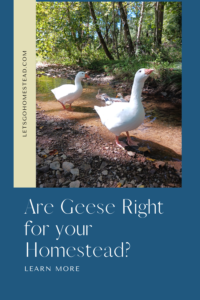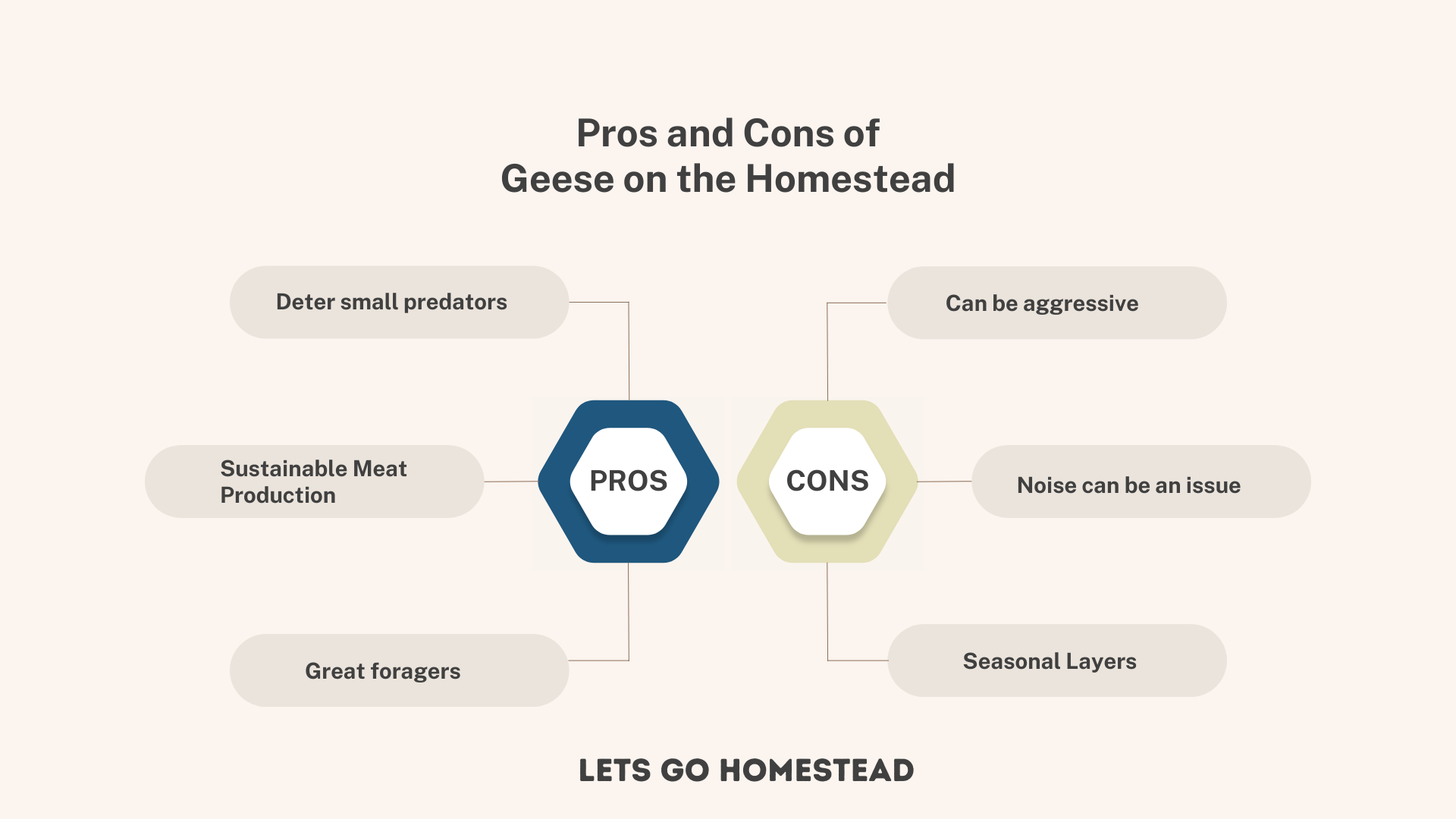
Are you considering adding geese to your homestead but unsure how they’ll fit into your ecosystem?
Explore the multifaceted roles geese could play in enhancing your self-sufficient lifestyle. In this post, we’ll review:
- The practical benefits of geese on the homestead
- Can geese be used as natural guardians for your smaller poultry?
- Understanding the sustainability of geese through their grazing habits
- Addressing potential challenges that come with raising geese on the homestead
Continue reading to unpack the pros and cons of geese on the homestead, ensuring your decision is well-informed and aligned with your homesteading goals.
Geese for Eggs and Meat Production
Raising geese on a homestead can be a powerful addition to your self-sufficiency, especially when considering meat production. Geese lay sizable eggs which are rich in nutrients and offer a unique flavor compared to standard chicken eggs. Although geese eggs are delicious and nutritious, they aren’t a great choice for an egg production animal alone. Geese are seasonal layers, and most breeds lay only a small amount of eggs, once a year during breeding season. Where geese really shine is in their sustainable meat production.
Goose meat, often considered a delicacy, provides a high yield of protein and other nutrients. Geese grow to a considerable size, and their meat is an excellent source of B vitamins, protein, and minerals like iron, making it a healthy option. Moreover, geese require less hands-on management for their growth and development, as their natural behaviors guide them to find the majority of their food through foraging, which can be a game-changer for homesteaders aiming for sustainable meat production.
With the rising interest in farm-to-table eating habits and the appeal of sustainable farming practices, geese provide an avenue for homesteaders to tap into niche markets. Whether you choose to sell meat, or live birds, geese can open economic opportunities with less competition than other poultry.
Geese as Guardians for Smaller Poultry
One role that geese have naturally excelled in for centuries is that of protector. Many homesteaders value geese for their vigilance and inherent ability to guard their territory, which includes smaller poultry such as chickens and ducks. These large birds are highly territorial and will sound an alarm at the approach of unfamiliar individuals or potential predators, providing an extra layer of defense for other livestock.
Geese are especially effective in deterring small to medium-sized predators, including hawks and raccoons, who might otherwise pose a serious threat to free-range poultry. With their bold and sometimes aggressive demeanor, geese can chase away intruders with their powerful honks, flapping wings, and assertive approaches. This behavior can reduce the losses associated with predation, offering peace of mind to the homesteader.
Although geese may not deter larger predators, they do add an extra layer of protection over these smaller predators. This can be a great addition to other protective measures, but do not rely solely on geese for predator protection.
We lost a duck to a day-time predator last spring, but the predator fled the scene without it’s prize, and we believe that the geese scared it off. However, nearly a year later, we lost our nearly 30 pound embden gander to a coyote. Keep in mind that they are still vulnerable to larger predators.
Overall, geese provide a natural and cost-effective way to deter smaller predators and enhance the security and biodiversity of the homestead.
Sustainability and Grazing Habits of Geese
Raising geese on a homestead is not only a step towards self-reliance but also a stride towards sustainability. These birds are natural grazers—given ample space, they will spend most of their day foraging for grass, seeds, and weeds, which aligns well with permaculture practices. As a result, geese contribute to the health of your land by stimulating plant growth and controlling unwanted weeds without the need for chemical interventions.
The grazing nature of geese means they can significantly reduce the homesteader’s reliance on processed poultry feeds, which are not only costly but also represent a reliance on outside sources. Their ability to forage the majority of their feed directly translates to savings in feed costs and more self-sufficiency for the homestead. In addition to their foraging efficiency, geese are hardy birds capable of thriving in various climatic conditions, which further underscores their role in a sustainable homestead system.
Our geese free range and forage all of their food in the spring through fall. We supplement their feed in the colder winter months, but they continue to forage in the fields and the pond even in the cold of winter.
Geese manure is a valuable byproduct that can be composted and used to enrich the soil, enhancing fertility and structure. This nutrient-rich amendment is beneficial for cultivating gardens and increasing the yield of crops on the homestead. The environmental benefits presented by geese, owing to their natural behaviors, establish them as an integral part of a sustainable homestead ecosystem, contributing to both its productivity and ecological balance.
Potential Challenges of Raising Geese on the Homestead
Despite the numerous advantages, raising geese on a homestead comes with its own set of challenges that require consideration. One significant concern is temperament. Geese can be territorial and protective of their space, leading to aggressive behavior, especially during the breeding season. This trait, while beneficial for deterring predators, can pose a risk to small children, visitors, or other animals on the farm.
Our gander does become aggressive at times, and he has even bit me on occasion. They are also very curious, and sometimes will “nibble” or tug at clothing, shoes, etc. This can be really frightening for small children or people who aren’t comfortable around animals. We escort our guests into the house to avoid any unwanted contact with the geese.
Another consideration is fencing. We allow our geese to free range and they often attempt to come in the house, leaving droppings on the lawn and walkways, and porch. We now use a baby gate to keep them off the porch.
The vocal nature of geese is another aspect to consider in your decision. Their loud honking can serve as a deterrent to potential threats and a natural alarm system; however, it can also be a source of noise pollution. This can be particularly troublesome in areas where neighbors are in close proximity and noise levels must be kept to a minimum.
Additionally, geese require adequate land to graze and roam. They are not suited to confined spaces, and without enough land, they can quickly overgraze, leading to land management complications such as soil erosion and plant depletion. Homesteaders must have ample space for grazing to prevent these issues and maintain a healthy and productive habitat for their geese.
Lastly, it is important to acknowledge that geese have a considerable appetite which, despite their grazing capabilities, can increase feed expenses during certain times of the year, particularly when grass is scarce. Homesteaders must plan for these seasonal variations in feed availability to ensure their geese remain well-nourished throughout the year.
Conclusion
Reflecting on the various facets of geese on the homestead reveals unique benefits and challenges.
- Geese contribute substantially to the homestead’s food resources through their meat production, and manure offering both nutritional benefits and market value.
- As natural guardians, geese provide an added layer of protection to smaller poultry, leveraging their instinctual behaviors to deter potential predators and alert homesteaders of potential threats.
- The sustainable nature of geese, attributed to their grazing habits, can lead to reduced feed costs and support a more environmentally-conscious approach to homesteading.
- Despite these advantages, prospective geese owners must consider the challenges, such as managing aggressive behavior, coping with high noise levels, and addressing the birds’ significant land and water needs.
In conclusion, geese can be a valuable addition to the homestead, balancing their roles as providers and protectors with the necessary considerations for their care. Weighing these pros and cons, each homesteader can make an informed decision on whether geese align with their sustainable living goals and resources.
Geese have been a welcomed and valuable addition to our budding homestead, and in our situation, the pros far outweigh the cons.

Geese on the Homestead FAQs
What benefits do geese offer for egg and meat production?
Geese eggs are larger than those of chickens, often sought after for gourmet cooking, but production is very low. Their meat is considered a delicacy in many cultures and is where they really shine as an addition to the homestead. Additionally, geese can be raised to market size with relatively low input, as they forage extensively, reducing the need for additional feeding and keeping costs low.
How do geese act as guardians for other poultry?
Geese have a natural instinct to be alert and protective, which makes them excellent guardians for smaller poultry like chickens and ducks. Their presence can deter predators due to their size, loud honking, and aggressive posture. Many homesteaders use geese to keep potential threats at bay, thus reducing losses of other birds on the property. Geese can be a valuable addition but should not be your sole source of security on the homestead.
Are geese sustainable to raise on a homestead?
Yes, geese can be a sustainable choice for homesteaders. Their ability to graze extensively means they can subsist largely on grasses, weeds, and other greenery available on the homestead, reducing the need for commercially processed feed. This grazing habit not only cuts down feed costs but also contributes to land management by keeping grasses trimmed and fertilizing the soil naturally with their droppings.
What challenges might I face with raising geese?
Raising geese comes with a unique set of challenges such as managing their aggressive behavior, especially during breeding season. Geese can be noisy, which might be a consideration if you have close neighbors. They also require access to ample land and water to thrive, which can be a concern for smaller homesteads. Additionally, if you have large predators such as coyotes and mountain lions, their safety needs to be taken into consideration.
Prioritizing these aspects is crucial if you plan to integrate geese into your farm ecosystem successfully.
